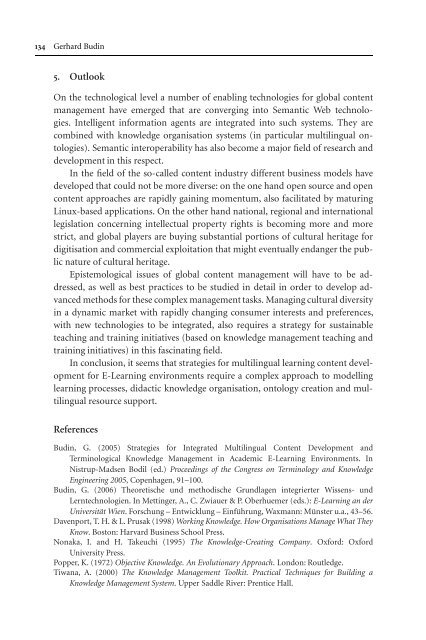Topics in Language Resources for Translation ... - ymerleksi - home
Topics in Language Resources for Translation ... - ymerleksi - home
Topics in Language Resources for Translation ... - ymerleksi - home
- No tags were found...
Create successful ePaper yourself
Turn your PDF publications into a flip-book with our unique Google optimized e-Paper software.
134 Gerhard Bud<strong>in</strong>5. OutlookOn the technological level a number of enabl<strong>in</strong>g technologies <strong>for</strong> global contentmanagement have emerged that are converg<strong>in</strong>g <strong>in</strong>to Semantic Web technologies.Intelligent <strong>in</strong><strong>for</strong>mation agents are <strong>in</strong>tegrated <strong>in</strong>to such systems. They arecomb<strong>in</strong>ed with knowledge organisation systems (<strong>in</strong> particular multil<strong>in</strong>gual ontologies).Semantic <strong>in</strong>teroperability has also become a major field of research anddevelopment <strong>in</strong> this respect.In the field of the so-called content <strong>in</strong>dustry different bus<strong>in</strong>ess models havedeveloped that could not be more diverse: on the one hand open source and opencontent approaches are rapidly ga<strong>in</strong><strong>in</strong>g momentum, also facilitated by matur<strong>in</strong>gL<strong>in</strong>ux-based applications. On the other hand national, regional and <strong>in</strong>ternationallegislation concern<strong>in</strong>g <strong>in</strong>tellectual property rights is becom<strong>in</strong>g more and morestrict, and global players are buy<strong>in</strong>g substantial portions of cultural heritage <strong>for</strong>digitisation and commercial exploitation that might eventually endanger the publicnature of cultural heritage.Epistemological issues of global content management will have to be addressed,as well as best practices to be studied <strong>in</strong> detail <strong>in</strong> order to develop advancedmethods <strong>for</strong> these complex management tasks. Manag<strong>in</strong>g cultural diversity<strong>in</strong> a dynamic market with rapidly chang<strong>in</strong>g consumer <strong>in</strong>terests and preferences,with new technologies to be <strong>in</strong>tegrated, also requires a strategy <strong>for</strong> susta<strong>in</strong>ableteach<strong>in</strong>g and tra<strong>in</strong><strong>in</strong>g <strong>in</strong>itiatives (based on knowledge management teach<strong>in</strong>g andtra<strong>in</strong><strong>in</strong>g <strong>in</strong>itiatives) <strong>in</strong> this fasc<strong>in</strong>at<strong>in</strong>g field.In conclusion, it seems that strategies <strong>for</strong> multil<strong>in</strong>gual learn<strong>in</strong>g content development<strong>for</strong> E-Learn<strong>in</strong>g environments require a complex approach to modell<strong>in</strong>glearn<strong>in</strong>g processes, didactic knowledge organisation, ontology creation and multil<strong>in</strong>gualresource support.ReferencesBud<strong>in</strong>, G. (2005) Strategies <strong>for</strong> Integrated Multil<strong>in</strong>gual Content Development andTerm<strong>in</strong>ological Knowledge Management <strong>in</strong> Academic E-Learn<strong>in</strong>g Environments. InNistrup-Madsen Bodil (ed.) Proceed<strong>in</strong>gs of the Congress on Term<strong>in</strong>ology and KnowledgeEng<strong>in</strong>eer<strong>in</strong>g 2005, Copenhagen, 91–100.Bud<strong>in</strong>, G. (2006) Theoretische und methodische Grundlagen <strong>in</strong>tegrierter Wissens- undLerntechnologien. In Mett<strong>in</strong>ger, A., C. Zwiauer & P. Oberhuemer (eds.): E-Learn<strong>in</strong>g an derUniversität Wien. Forschung – Entwicklung – E<strong>in</strong>führung, Waxmann: Münster u.a., 43–56.Davenport, T. H. & L. Prusak (1998) Work<strong>in</strong>g Knowledge. How Organisations Manage What TheyKnow. Boston: Harvard Bus<strong>in</strong>ess School Press.Nonaka, I. and H. Takeuchi (1995) The Knowledge-Creat<strong>in</strong>g Company. Ox<strong>for</strong>d: Ox<strong>for</strong>dUniversity Press.Popper, K. (1972) Objective Knowledge. An Evolutionary Approach. London: Routledge.Tiwana, A. (2000) The Knowledge Management Toolkit. Practical Techniques <strong>for</strong> Build<strong>in</strong>g aKnowledge Management System. Upper Saddle River: Prentice Hall.
















